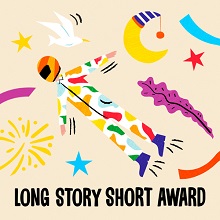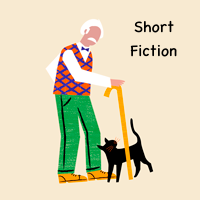The children don't understand.
The sweets they pine for are not squeezed from the machine with stripes intact. No—they must be painted on, by hand, with so much care. It is almost unimaginable, the
...
[+]
I first met him one evening at a soiree made known to me by a friend of a friend. Originally I hadn't intended on going, as I'm something of a reserved person myself, but I found myself donning my coat and hat and walking the short way to the designated place. Mere moments from when I stepped over the threshold, ushered in by my friend, he was pointed out to me. I'm sure the other guests must have made the customary efforts to engage with me in small talk, but I confess I remember very little. You must forgive me, however, for if you too had locked eyes with him, you would have forgotten everything else as well. Other contemporaries of ours have waxed poetic about his charm and countenance, so I will spare you the paragraphs and sonnets dedicated to his hair, his laugh; his wit, for while his entire being had a weight and gravity incomparable, for me, it all centered in his eyes.
At the risk of sounding like a poor imitation of one of the Romantics, I cannot but concur with accounts of his intimate friends in saying that they were magnificent, like nothing that ought to belong in this mortal realm. Constantly they changed color, and as I was ensnared by them that night, I watched in awe as one moment they seemed to be green as the light filtering through a canopied forest, then, upon blinking, becoming the brown of the loamy earth, only to be caught by the light and revealing themselves to reflect the azure ocean, sparkling with the golden kisses of the sun. What went on behind those glittering irises, I can only begin to imagine, but all at once I knew they hid something both ethereal and unfathomable. Thus, I ask for your understanding in my being embarrassingly enraptured in that small eternity of those brief seconds. I imagine I looked quite the fool standing there, barely breathing, but he smiled at me ever so softly and beckoned me come. He said nothing, but still I knew somehow that he wanted me to sit in the recently vacated armchair in front of him. How he managed to disperse the throng of equally enthralled guests surrounding him, I still do not know, and can only explain as part of the effect the god had on the mortal mind. In any case, I acquiesced with his silent entreaty and sat before him in the chair, which was much more comfortable than it really ought to have been. Unsure what to say to the man who had taken Victorian England’s literary community by storm, I was grateful that he was the first to speak.
"Welcome, friend. I've never seen you here before. Might I ask your name?"
“John. John Appleton, sir.”
“Ah, a charming name, indeed.” He rested his cheek upon his hand and regarded me carefully. His ever-changing eyes seemed to strip me bare, but in what manner of emotion I could not discern. “Perhaps you are already aware of who I am, but I think it in good fashion to introduce myself regardless. I am Oscar Wilde.”
“Very pleased to meet you, sir. I’m rather fond of your work, Mr. Wilde,” I replied, and his smile nearly blinded me.
“Is that so? I’m flattered. Are you an artist yourself?”
“I am but an amateur, sir.” Sitting in front of an artistic legend, I dared not give any of my clumsy excursions with a pen the lofty identity of art, let alone apply the same title that he so deftly filled to myself, but as the words left my mouth, the man fixed me with a stern gaze I could not tear myself away from, had I any thought to attempt the feat.
“Oh dear John! Do not say so with such shame! Why, the word itself comes from the Latin amator, or lover. There is no greater thing to be than a lover of art, for you know what beauty is.”
I do not know if it was the way he looked at me, or something godly in the wine we drank together, but in that moment, I knew that he was more than any other man I’d ever met before, and should he ask, I would gladly attend him for the rest of my life. He was surrounded by passion, and inspired it with every word that fell from his lips. Yet, he was never at the mercy of his emotions. He used them, enjoyed them, and dominated them, and I could naught but follow in his wake, intoxicated by his every move. Guests flickered in and out of conversation with him, all feeling, as I did, the gravity that pulls everything into his orbit. All were infected by the intensity in his countenance, and it quickly became clear to me as I watched people spin around us that to be in the presence of Oscar Wilde was to drink of a desire that was all at once malady and madness. But oh, how sweet the taste.
I confess I was no more immune to this drunken haze than any other, and I fully admit to being swept up in his atmosphere. Perhaps it is the artist in me, or perhaps it is the quiet pining lover, but even as I was drawn into the invisible hurricane surrounding him, I found myself at its center, with him instead of with the whirlwinds he created in the party and the social fabric of England at large. I am not one to speak at great length without the mediator of a pen and paper, so instead I chose to watch and listen. I do not remember how I ended up at his side in the corner of the room, but I suppose it matters not, for as in the eye of a hurricane, everything else is drowned by the awe of the moment in its eternity.
“You are like me,” he said in a voice so soft it would not have been heard save for the silence that we inhabited. I dared not reply for fear of breaking it. “We are both companions of suffering.”
I did not know what he meant, but when he looked at me, I could see his own words reflected back at me in his eyes. “Behind every exquisite thing that existed, there was something tragic.” And with the pain I cannot speak that inks my pen and paints my roses crimson, I understood.
“Death must be so beautiful,” he whispered. “To lie in the soft brown earth, with the grasses waving above one’s head, and listen to silence. To have no yesterday, and no tomorrow. To forget time, to forgive life, to be at peace.”
I took his hand in mine, and said nothing. His hair seemed to shimmer a deep purple, and time slowed around us as tears rolled silently down his cheeks. “I, only I, must wander wearily, and bruise my feet, and drink wine salt with tears.”
“A bitter sorrow which predicates a luscious beauty, like nectar to the taste.”
My words must have surprised him, for he looked at me then with some unidentifiable emotion before his expression settled into something akin to amusement. Having said my piece, I remained silent.
“You know me,” he said, his eyes crinkling at the corners as he smiled, still shimmering with the sadness from the moments just before.
“I do, sir.” Though how I did remains a mystery even to me. Somehow, I saw him, and I knew him for the god that he was.
“No one has seen me so quickly for a very long time. You really are special.”
I don’t recall returning home that night. The rest of the evening blurs together in my mind, and all I can clearly recall is the sound of his laugh and the softness of his touch. What I did to earn a glimpse of the man behind the mask and the god behind the man will forever elude me. I never saw him again after that night, but sometimes, as I gaze at the glittering moon through the window of my bedroom, I pour myself a glass of wine, and I can hear him laugh.



